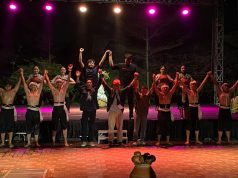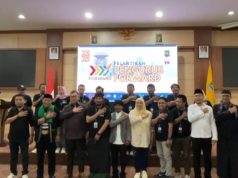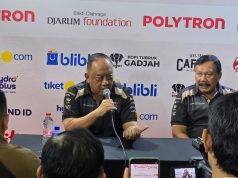CCN, Cilegon – Education serves as a crucial foundation in shaping competent and outstanding generations. The development of students’ talents and interests is one vital aspect of the educational world. In this endeavor, the MAN 1 Cilegon Journalism Training emerges as a pivotal step in nurturing the journalistic potential of the younger generation.
The Student Journalism Training is a training program aimed at introducing the world of journalism to students at MAN 1 Cilegon. This program focuses on developing writing skills, conducting interviews, and editing news content. Beyond providing fundamental knowledge, this training aims to enhance the abilities and quality of the school’s journalism executives.
The opening event for this year’s Journalism Training was held in the classrooms of MAN 1 Cilegon. Participants had a unique opportunity to interact directly with local journalism professionals who served as speakers. Among them were H. Diki Hermawan, Ahdi Zuhruf Amri, Zainal Mutakin, Asep Saefudin, and Ikhwan Hadi Susanto. Participants gained deep insights into the role of extracurricular activities in developing students’ life skills, managing journalistic ethics, understanding news and event photography, designing layouts, and developing social media content, as well as literary and media writing techniques.
During the Student Journalism Training, participants were not limited to theory alone. They engaged in practical exercises, including conducting interviews, gathering information, and writing news articles for publication. This practical experience is a crucial step in providing real-world exposure to the field of journalism.
Ahdi Zuhruf Amri, the Head of the Journalism Extracurricular at MAN 1 Cilegon, explained that this training goes beyond imparting knowledge and skills; it also opens up early career opportunities. In today’s digital age, the mass media industry is rapidly expanding, leading to a continuous demand for quality journalists. “Talented participants of the Journalism Training have the opportunity to pursue further education in journalism or even contribute to local media outlets or their own school,” he added.
Hj. Maryati, the Head of MAN 1 Cilegon, who is also a prolific writer, delivered the opening speech with insightful words: “As Muslims, we all know and understand that the deeds questioned in the hereafter will revolve around prayer. However, remarkably, Allah revealed the first verse to humanity, which was not about prayer but about ‘iqro’ – reading! This illustrates Islam’s strong encouragement for reading. That’s why the digital magazine owned by MAN 1 Cilegon, set to launch in October, is named ‘IQRO.'”
This training emphasizes three fundamental aspects of journalism: knowledge, skills, and attitude. A journalist must be capable of distinguishing various types of writing, such as opinion pieces, columns, essays, news reports, and literary works, including poetry, rhymes, short stories, novels, and visual representations.
Skills encompass the ability to conduct interviews, time management, and effective writing. This is essential to ensure that articles are correctly categorized without mixing personal opinions with news reporting. These skills may be challenging for beginners, but with continuous practice, they become second nature.
The third pillar of journalism is conscience. The conduct and ethics of a journalist, especially one with an educational background from a madrasah, must reflect strong religious values. May this noble conduct distinguish madrasah-trained journalists from others. Good conduct and ethics are not only demonstrated towards the Creator but also towards fellow creations of Allah. The publication of written content or images always requires permission from the concerned parties.
We hope that the young journalists from MAN 1 Cilegon will grow into talented, morally upright journalists who fearlessly convey the truth rather than predetermined narratives. We anticipate that they will become role models in the field of journalism and make positive contributions to both society and the development of their school. (red)






